15 Best API Management Tools For Seamless Connectivity
Summarize this article with:
.png)
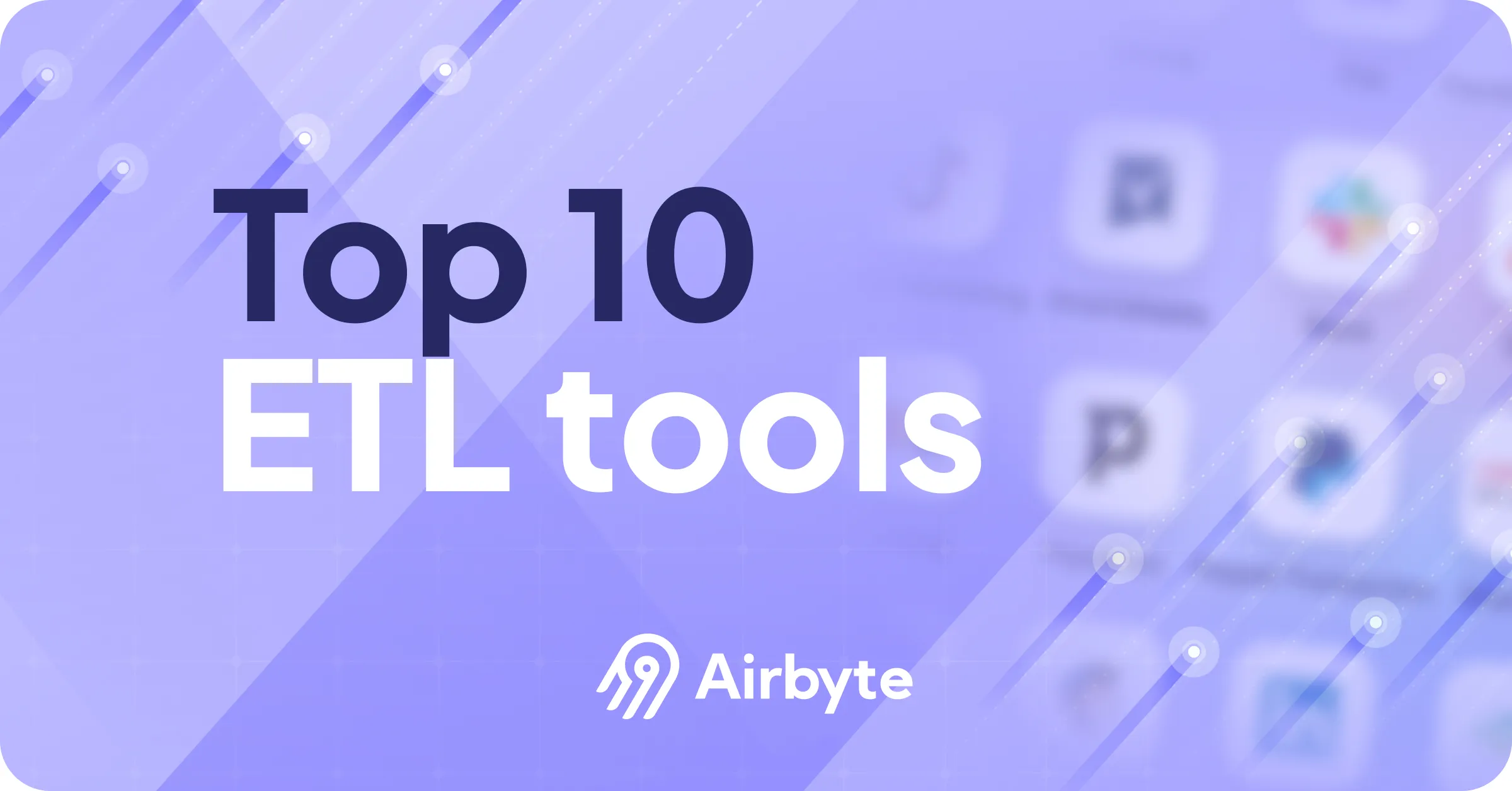
APIs, or Application Programming Interfaces, are essential tools that enable different software applications to communicate with each other. APIs help efficient data exchange and drive innovation internally and externally within your organization. With around 90% of developers depending on APIs, effective API management is becoming increasingly important. This article outlines the 15 best API management tools, pricing plans, and ratings based on Gartner reviews.
What Is an API Management Tool?
API management tool provides a set of services that allow you to easily develop, operate, monitor, and scale APIs in secure environments. You can deploy these tools on-premises, in the cloud, or using a hybrid on-premises-SaaS approach.
API management tools enable building APIs from scratch, setting endpoints, and adding advanced features. Using these tools, you can connect your applications, data, and services with other platforms like Salesforce, HubSpot, and more without extensive coding. With such integrations, your applications can provide a better user experience.
15 Best API Management Tools
The following section highlights the 15 best API management tools that streamline the process of designing, deploying, and monitoring APIs.
1. Airbyte
Airbyte is an AI-powered data movement and replication platform equipped with distinct APIs to facilitate programmatic interaction and management. The platform offers two APIs—Airbyte API and Configuration API.
Airbyte API allows you to programmatically interact with the Airbyte platform to streamline and automate data integration processes. Configuration API, on the other hand, is an internal API that helps the Airbyte team communicate with different Airbyte components.

Airbyte’s primary focus on providing reliable data movement complements its API functionalities. It enables you to efficiently extract data from various sources, transform it as needed, and load it into your preferred destination. The platform’s 550+ pre-built connectors, user-friendly interface, and other robust capabilities provide comprehensive support for data-centric applications.
Standout Features
- Modern GenAI Workflows: You can streamline your AI workflows by loading unstructured data directly into popular vector stores like Weaviate, Milvus, Pinecone, and more. Airbyte also enables you to perform RAG transformations like automatic chunking and indexing, converting your raw data into a format ready for LLM applications.
- Custom Connector Development: With Airbyte’s AI assistant and Connector Builder feature, you can build custom connectors in minutes without needing any coding knowledge. The AI assistant automatically pre-fills and configures several fields and provides smart suggestions to fine-tune your connector configurations.
- Change Data Capture (CDC): Airbyte’s CDC feature allows you to track the latest modifications in the source database and copy them into your destination system.
- Efficient Data Transformation: With Airbyte and dbt integration, you can define and apply custom transformations to your data pipelines.
- Developer-Friendly Pipelines: PyAirbyte is a developer-friendly, open-source Python library offered by Airbyte. It allows you to programmatically interact with Airbyte connectors to extract data from various sources within your Python workflows.
- Open-Source: In addition to its cloud-based version, Airbyte also provides an open-source edition. This edition allows you to deploy your Airbyte instance either locally using Docker or on a virtual machine. The open-source edition helps you utilize all the built-in connectors, low-code connector builder, and schema propagation features.
- Self-Managed Enterprise: Airbyte has announced the general availability of the self-managed enterprise, which provides centralized control of user access and self-serve data ingestion. It enables you to work with multi-tenant data mesh or data fabric architectures and can operate in air-gapped environments.
- Data Security: Airbyte supports SSL, TLS, and HTTPS encryption, along with SSH tunneling, for secure data transfer. Additionally, Airbyte complies with SOC 2 Type II assessment and ISO 27001 regulatory standards for safe data management throughout the integration process.
- Vibrant Community: Airbyte’s active forum helps you browse discussions on various topics, deployment tips, troubleshooting, and data integration practices. You can also share knowledge and experiences with other Airbyte users.
Pricing
Airbyte offers the following transparent and scalable pricing options:
- Airbyte Cloud: If you are a data practitioner looking only for an efficient way to synchronize data between different systems, Airbyte Cloud is a good choice.
- Team: If your organization is looking for a solution to scale efficiently, a cloud-hosted plan, Team, would be a great option. However, you must connect with the Airbyte team to discuss your actual needs and obtain customized pricing.
- Self-Hosted Enterprise: This edition would be an ideal choice if you are looking for more security and control. It provides enterprise support with SLA and allows self-hosting in your own Virtual Private Clouds (VPCs).
Ratings
According to Gartner, Airbyte has a rating of 5 out of 5, with users appreciating its ease of use, extensive connector options, and service support.
2. Apigee
Apigee is Google Cloud’s API management tool. It allows you to develop, manage, and secure APIs without any technical expertise. Apigee provides high-performance API proxies to create a consistent interface for your backend services to control traffic.

Why Is Apigee the Best API Management Tool?
- Apigee is developer-friendly and supports various styles, such as REST, SOAP, GraphQL, and gRPC, to provide flexibility in implementing any API architecture.
- It can support high volumes of API requests over time without compromising performance.
- Apigee API proxy offers granular control over quotas, rate limits, security, transformations, analytics, and more for all your backend services.
Standout Features
- Advanced API Security: Apigee’s security capabilities help you analyze API traffic to detect suspicious requests, abuses, and API configurations that do not meet security standards. It also offers recommendations to address these issues.
- API Reliability: Apigee’s API proxies allow you to modify your backend services while ensuring that front-end applications continue to use them without interruptions.
- API Monitoring: API monitoring enables you to track your APIs to ensure they are available and running correctly. It creates alerts to inform you about changes in API traffic so you can take immediate action before they affect your customers.
Pricing
Apigee provides three flexible pricing plans to accommodate your API management needs:
- Evaluation: You can utilize industry-leading API management features at no cost for 60 days.
- Pay-as-you-go: You are charged based on API calls, operational environments, proxy deployments, and add-ons.
- Subscription: Apigee offers three subscription plans, including standard, enterprise, and enterprise plus, which are available only upon request.
Ratings
Apigee has a rating of 4.5 out of 5 on Gartner. Many find the platform user-friendly and appreciate the extensive documentation and support. Apigee is praised for its ability to handle large volumes of API traffic effectively.
3. MuleSoft
MuleSoft is a unified integration and automation platform owned by Salesforce that allows you to connect applications, services, and data. MuleSoft’s Anypoint platform provides a robust set of API management features to enable you to create, manage, secure, and govern your APIs.

Why MuleSoft Is the Best API Management Tool?
- Using the Anypoint CLI, you can automatically discover APIs built on any platform, including the metadata and documentation from your Git repositories or CI/CD pipelines.
- With Datagraph, you can reuse multiple APIs in a single GraphQL request without writing new code, accelerating application delivery and innovation.
Standout Features
- Flex Gateway: Anypoint Flex Gateway is an ultrafast solution that can help you manage and secure APIs wherever they run. It allows you to integrate smoothly with DevOps and CI/CD workflows, which offers high performance and security for any application.
- API Governance: When dealing with numerous APIs across various teams and design tools, Anypoint API Governance provides self-service tools to ensure consistent quality and security for APIs. It also helps in minimizing overhead due to conformance review cycles and reduced hassle.
- API Manager: In just a few steps, you can secure APIs with policies, manage client access, organize APIs as products, and gain valuable insights into your API programs. API Manager allows you to manage all your APIs and microservices from a single platform, regardless of their location.
Pricing
MuleSoft’s Anypoint Platform provides the following flexible, custom-fit pricing plans for your business needs.
- Anypoint Integration Starter: This starter plan is for beginners who want to begin with API design, management, and deployment.
- API Management Solution: A comprehensive plan for full lifecycle API management. It uses the Flex gateway to handle and protect your APIs.
Ratings
Based on Gartner ratings, the MuleSoft Anypoint Platform has 4.3 ratings out of 5. These ratings suggest that MuleSoft is easy to use and good at API management.
4. Kong Konnect
Kong Konnect is a SaaS-based API lifecycle management platform that enables you to develop modern applications faster and more securely. It helps simplify multi-cloud API management by providing the control plane to deploy and manage your APIs in cloud, on-premises, Kubernetes, or virtual machines.

Why Kong Konnect Is the Best API Management Tool?
- With Konnect, you can easily manage Kong Gateway, which minimizes your time writing boilerplate code to protect your APIs.
- If you are a startup, Konnect offers features like API cataloging, developer portals, and analytics to help you manage, share, and monetize your APIs effectively.
- If your organization is a large enterprise, you can control the geographic region (AU, EU, or US) where Konnect’s API control plane operates. This lets you run Konnect close to your end users for better performance and helps you ensure data privacy and regulatory compliance.
Standout Features
- Service Hub: Service Hub allows you to catalog all your services into a single location for your organization’s service inventory. This helps your development teams quickly search, consume, and reuse internal APIs to accelerate time to market.
- Dedicated Cloud Gateways: Konnect offers dedicated Cloud Gateways that facilitate a high-performance, scalable, and highly available global API management infrastructure. You can run these gateways in autopilot mode, which automatically adjusts to API traffic.
- API Products Dashboard: Each API product includes at least one version, each linked to a Gateway service. Using an API product dashboard, you can configure API products, publish them to a Dev Portal for use, and view traffic, error, and latency data.
Pricing
Kong Konnect offers two flexible pricing plans:
- Plus: Kong Konnect’s Plus plan offers a 30-day free trial to help you scale your API management efficiently. You will then be charged for each service you use.
- Enterprise: The Enterprise plan offers a custom solution with full-time technical support and volume discounts.
Ratings
On Gartner, Kong Konnect has a rating of 4.7 out of 5. Based on many reviews, Kong API Gateway can help handle a lot of API requests and supports numerous plugins for adding features. It is easy to set up, has extensive documentation, and reliable customer support for seamless AI management
5. Amazon API Gateway
Amazon API Gateway is a fully managed AWS Service that helps your organization's developers quickly build, publish, and secure APIs. With Amazon API Gateway, you can create WebSocket APIs that enable real-time communication applications. API Gateway also allows you to build RESTful APIs for optimizing serverless workloads and HTTP API for HTTP-based backend systems.

Why Amazon API Gateway Is the Best API Management Tool?
- Amazon API Gateway can help with API traffic management, cross-origin resource sharing (CORS) support, version management, and more without upfront costs.
- From the API Gateway dashboard, you can track performance metrics, API call information, latency data, and error rates.
Standout Features
- Resiliency: API Gateway helps you control traffic to your backend systems with the help of throttling rules. These rules enable you to limit the number of API requests a user can make in a specified time. So, you can fully focus on your business logic instead of the high API traffic management.
- Authorization: API Gateway allows you to authorize and verify API requests to your AWS services using Signature Version 4 for REST and WebSocket APIs. With Signature Version 4 authentication, you can use AWS IAM to control access to your APIs and other AWS resources.
- API Keys: You can generate API keys, set specific permissions for each key, and distribute them to third-party developers to access your REST APIs.
Pricing
Amazon API Gateway provides a free tier that includes one million REST API calls, one million HTTP API calls, and one million messages/750,000 connection minutes for WebSocket APIs per month. These options are only available to new customers for up to 12 months. If you exceed these limits, you will be billed monthly or annually according to the HTTP, REST, and WebSockets API usage rates.
Ratings
Amazon API Gateway has 4.5 out of 5 ratings on Gartner, reflecting positive user feedback for its ease of use, API management, and security.
6. IBM API Connect
IBM API Connect is a robust API lifecycle management platform that allows you to create, manage, secure, and monetize your APIs. The IBM API Gateway is built on IBM DataPower, an enterprise solution that lets you securely expose data and business applications on-premises and across clouds. DataPower also allows you to log and report API interactions to API analytics for insights and reporting.

Why IBM API Connect Is the Best API Management Tool?
- IBM API Connect offers a native developer toolkit with a GUI, a command-line interface, and an optional local test environment. These tools allow you to iteratively build API definitions in REST, SOAP, or GraphQL style.
- You can secure the APIs with the OAuth provider, test them locally, and publish APIs on IBM API Connect.
Standout Features
- Flexible Deployment: IBM API Connect offers versatility in deployment, allowing you to use it wherever your applications and data are located. This flexibility ensures that your API management adapts to your unique architecture and business needs.
- API Testing: Testing is essential for trusting your API program. IBM API Connect offers robust testing capabilities that leverage automation and AI, which enables you to test APIs without manually writing test cases.
Pricing
IBM API Connect provides flexible and customizable pricing plans as follows:
- Base: The base plan allows multiple team members in your organization to share the same API management platform hosted on the AWS. However, their data is kept separate and secure. The base plan charges USD 83 per month for 100,000 API calls.
- Advanced: This plan is similar to the Base Plan but with a single-tenant gateway and advanced features like private data connectivity. Advanced plan pricing starts at USD 2,280 per month for 1,200,000 API calls received.
- Reserved Instance: Unlike the Base and Advanced plan, the Reserved plan is consumed as a single-tenant service on IBM Cloud. This plan meets your needs for isolation and availability. The reserved Instance plan starts at USD 6,504 per month.
- Software: A software plan is useful for a customized solution where you can deploy your APIs on-premises, in the cloud, or in a hybrid environment. Pricing is available upon request.
Ratings
According to Gartner, IBM API Connect has a rating of 4.5 out of 5.
7. Microsoft Azure API Management
Azure API Management is a hybrid, multi-cloud API management solution that enables you to create, publish, and manage APIs across all environments. It offers features like API mocking, versioning, revisions, and automated documentation.
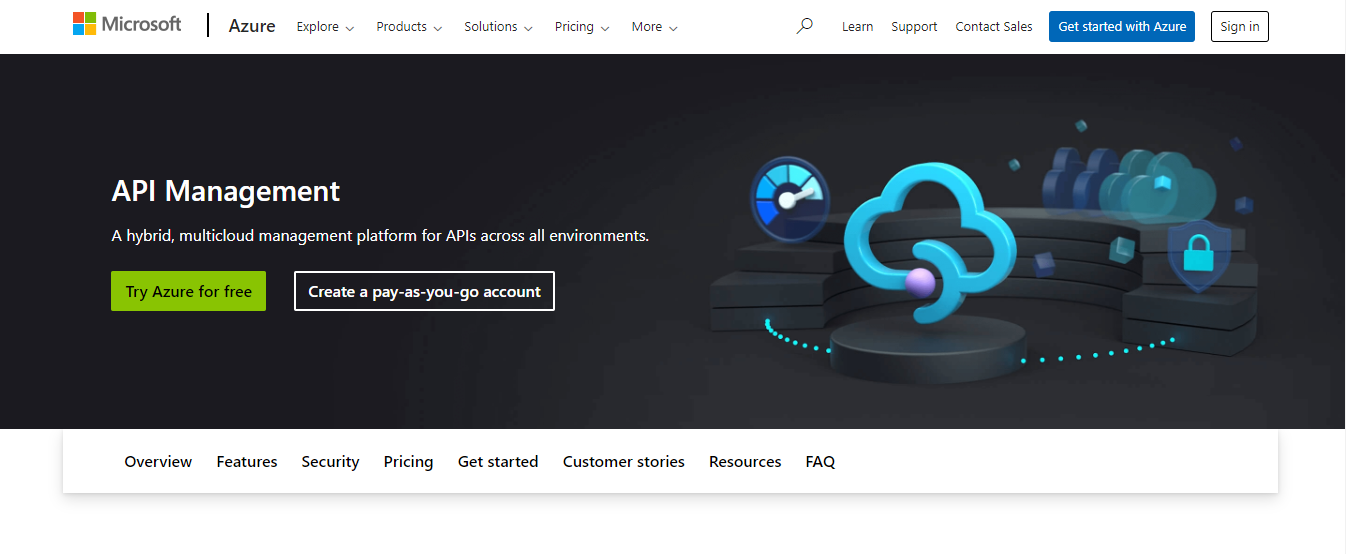
Why Azure API Management Is the Best API Management Tool?
- With Azure API, consolidate all your APIs behind a single static IP or domain and secure them with jets, tokens, and IP filtering.
- You can also implement flexible quotas and rate limits, customize API behavior with policies, and improve scalability through response caching.
Standout Features
- Self-hosted Gateway: Azure API allows your organization to manage APIs hosted on-premises and across clouds from a self-hosted gateway. This is done by deploying a containerized version of the API management gateway in the same environments where your APIs are hosted.
- Innovative Transformation: You can transform your existing services by automating the conversion of legacy web applications into modern REST APIs with a simple interface for your backend systems.
Pricing
Azure API management offers flexible pricing plans:
- Consumption: A plan ideal for lightweight and serverless API management and billed $0.042 per 10,000 API operations.
- Developer: A plan designed for non-production workloads and evaluations, starting at $0.07 per hour.
- Basic: A plan that is suitable for entry-level production use cases and bills $0.21 per hour.
- Standard: A plan designed for medium-volume production scenarios and charges $0.95 per hour.
- Premium: This plan is best for high-volume or enterprise production cases. It starts from $3.83 per hour.
Ratings
According to Gartner, Azure API management has a rating of 4.3 out of 5. Many users found that it has a good API manager, but improvements are needed in the developer portal.
8. Postman
Postman is a powerful tool that simplifies the entire API lifecycle, from development and testing to collaboration and deployment. It offers a user-friendly interface for creating, managing, and sharing APIs, accelerating development and enhancing team productivity.

Why Postman Is the Best API Management Tool?
- Postman allows you to integrate powerful tools like Apigee, Azure API, and more into your software development pipeline to design your API definitions before implementation.
- You can extend the Postman platform through Postman API and open technologies.
Standout Features
- API Repository: Postman offers a cloud-based, version-controlled repository that allows you to easily store, catalog, and collaborate on all your API-related assets. This centralized repository also allows you to gather metrics and gain insights through Postman’s built-in governance features.
- Postman API Client: An essential tool that helps you to explore, debug, and test APIs easily. It supports complex API requests for HTTP, REST, SOAP, GraphQL, and WebSockets. You can organize these requests into Postman Collections for reuse, saving time and avoiding the need to rebuild requests from scratch.
- Postman Workspace: With Postman workspaces, you can share your projects with external and internal teams of your organization. Additionally, the workspace automatically notifies team members about API updates in real-time.
Pricing
Postman platform offers the following pricing plans:
- Free: The Free tier would be a great choice if you are a beginner or have a team of 3 members who are looking to start testing APIs at no cost.
- Basic: The basic plan is an excellent choice for basic API collaboration within a single team of unlimited members. It charges $14 per user per month.
- Professional: The Professional plan is best for API collaboration across larger teams, multiple organizations, and external partners. It starts from $29 per user per month.
- Enterprise: For organization-wide API development with advanced support and security, you should choose the Enterprise plan that bills from $49 per user per month.
Ratings
On Gartner, Postman has 4.5 out of 5 ratings. Many users have recommended this platform for testing APIs before implementation.
9. TIBCO Cloud API Management
TIBCO Cloud API Management is a modern API platform that helps manage your enterprise’s entire API lifecycle. It supports cloud-based development and deployment practices such as DevOps, microservices, and containers.

Why TIBCO Is the Best API Management Tool?
- TIBCO utilizes an API-led design approach to allow you to create a detailed specification of your API, including the endpoints, request/response formats, and data models.
- Using a few simple steps, you can transform your APIs into products and create a single access point for your APIs.
Standout Features
- Use of Clusters: TIBCO Cloud API Management enables you to create clusters to effectively manage API traffic within your local environment. The number of clusters created depends on your network’s capacity.
- Call Transformation: The Call Transformation feature enables you to use pre and post-processors with API management endpoints. This can improve API requests and responses and ensure compatibility between different systems by converting data formats or communication protocols.
Pricing
TIBCO provides the following pricing plans for your APIs:
- Basic and Premium: Both the basic and premium plans support API modeling and mocking, which creates a simulated version of an API before the actual backend services are implemented.
- Hybrid: The hybrid plan combines all features of the basic plan with API management for up to 1 million queries per month.
Ratings
On Gartner, TIBCO Cloud API management has a rating of 4.3 out of 5. Many reviews reflect that TIBCO API is an excellent tool with built-in features, such as limiting the API calls per minute, hour, or day.
10. Boomi
Boomi, an Integration Platform as a Service, enables you to improve your business with smart integrations and automation. It provides comprehensive API management capabilities that allow you to design, build, manage, and secure APIs across various environments.
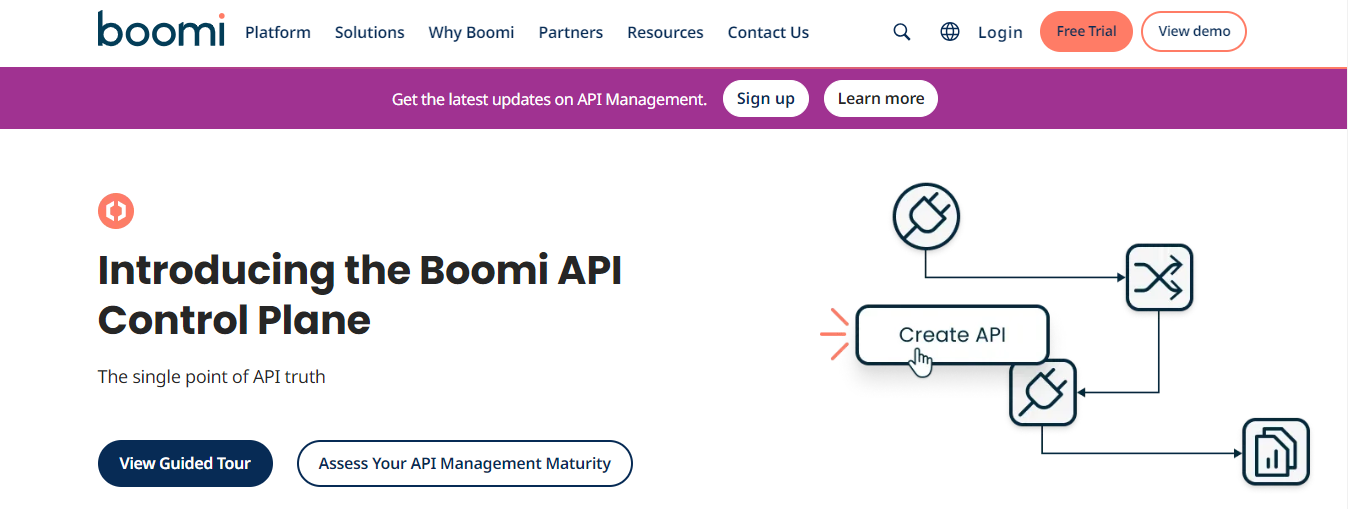
Why Boomi Is the Best API Management Tool?
- Boomi’s API Control Plane helps you make your APIs, including shadow APIs, discoverable, manageable, and secure.
- It offers an abstraction layer that separates the published API from the underlying integration.
Standout Features
- Application Management: Boomi helps you assign application-level API keys to facilitate easy adoption by API consumers and monitor the business value of your APIs.
- Intuitive Interface: Boomi is known for its user-friendly interface. With Boom’s API management, you can easily create APIs from integrations using a simple one-click wizard.
- Multi-cloud Runtime: Boomi offers API Gateway to provide a flexible, multi-cloud, and autonomous runtime environment, allowing you to manage and secure APIs.
Pricing
You can try Boomi free for 30 days or choose the following pricing options:
- Professional: This plan covers essential integration features suitable for your business.
- Pro Plus: This plan enhances the Professional tier with advanced capabilities for handling larger data volumes and real-time integrations.
- Enterprise: The enterprise plan is designed for larger organizations with more complex integration needs.
- Enterprise Plus: This plan provides extra connectivity options, customization, and support for very large enterprises.
Ratings
Boomi has 4.5 out of 5 ratings on Gartner. Users reviewed its effortless ability to manage any type of API in a single platform.
11. Tyk
Tyk is an API management platform that empowers you to design, build, secure, and scale your APIs efficiently. It supports a wide range of protocols, including HTTP, REST, and SOAP. In addition, it enables you to seamlessly connect to event brokers and streaming platforms like MQTT, Kafka, AMQP, and NATS.
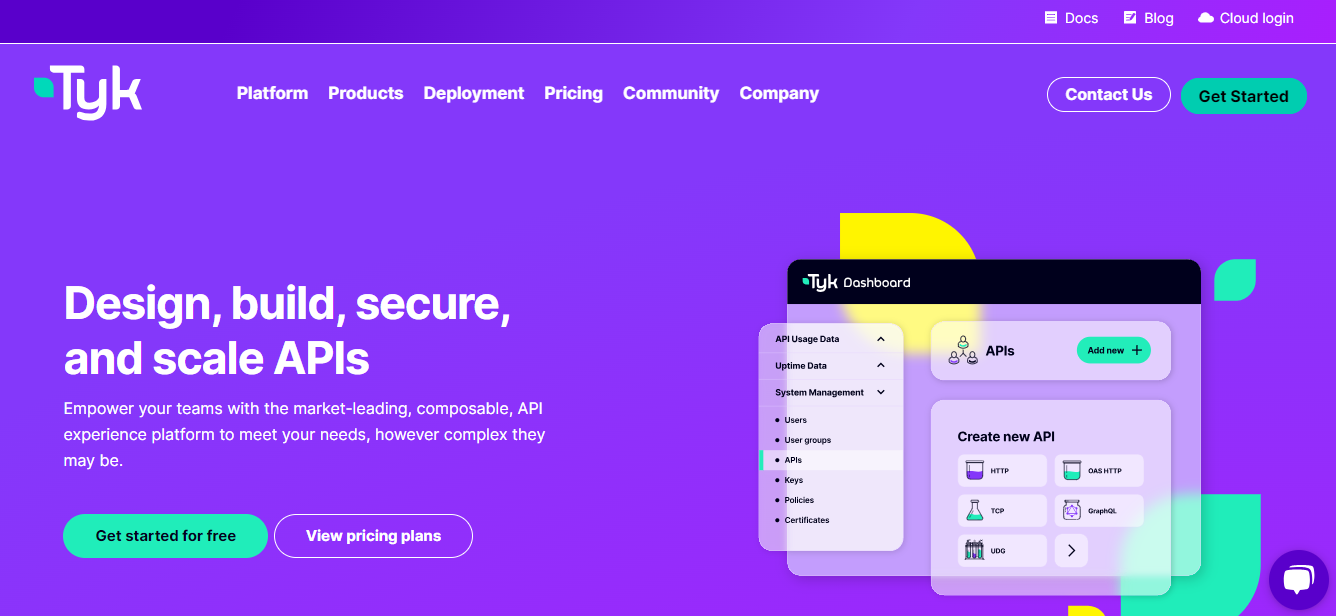
Why Tyk Is the Best API Management Tool?
Tyk provides a fast, scalable, and modern open-source API gateway for securing your APIs.
Standout Features
- Universal Data Graph (UDG): UDG helps you to merge multiple APIs into a single, unified interface. Using GraphQL, you can access various APIs through a single query.
- Tyk Operator: A Kubernetes operator that streamlines the management of Tyk API configurations in both Kubernetes and non-Kubernetes environments.
Pricing
Tyk offers scalable pricing plans as follows:
- Starter: From $600 per month, you can begin API management with multiple deployment options, including cloud, hybrid, or self-managed.
- Scale: This plan allows you to achieve API platform adoption at scale with no consumption limits, and you can start at $3,750 per month.
- Enterprise: Enterprise would be a great choice for enjoying unparalleled flexibility and exceptional support for high-traffic, multi-cloud, and multi-region environments.
Ratings
Based on Gartner, Tyk has a rating of 4.7 out of 5 for providing excellent API management capabilities.
12. WSO2 API Manager
WSO2 API Manager is an open-source API management platform that lets you build, integrate, secure, and monitor your API across diverse environments. With its extensive feature set, you can accelerate your API strategy tailored for your organization’s API designers, product managers, operations teams, and consumers.
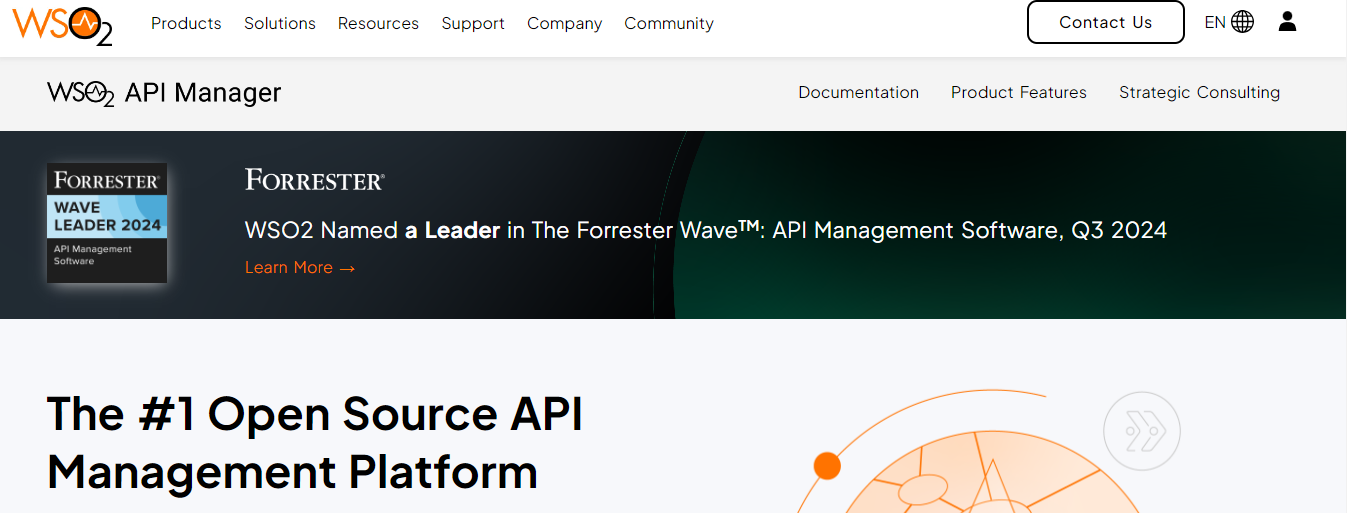
Why WSO2 Is the Best API Management Tool?
- WSO2 API Manager supports everything from basic use cases to complex protocol requirements.
- It allows you to integrate with the Micro Integrator dashboard, which provides a comprehensive graphical view of your API deployment.
Standout Features
- Interoperability: By using REST, GraphQL, and AsyncAPIs, you can achieve smooth interoperability between different systems while avoiding vendor lock-in.
- Advanced Integration Support: The integration runtime enables you to create composite microservices, handle transformations, and orchestrate services for seamless data flow across various systems.
- API Security: Key security features such as OAuth access control, detailed security policies, and threat protection mechanisms ensure secure API access. You can also extend the platform's advanced security and identity management solutions.
Pricing
For commercial and production use, you must require a paid WSO2 subscription. WSO2 offers flexible pricing plans based on transactions, CPU cores, and custom enterprise licenses. However, you can use it freely for evaluation, educational, and non-commercial purposes.
Ratings
On Gartner, WSO2 has a rating of 4 out of 5 because of its extensive customer support.
13. Workato
Workato is a comprehensive integration platform that includes API development and management capabilities. It allows organizations to design, build, secure, and manage APIs efficiently. By offering features such as API creation, governance, and API customization, Workato empowers you to optimize and manage your API lifecycle.

Why Workato Is the Best API Management Tool?
- Workato API platform lets you create API recipes, a custom set of instructions to help you automate workflows between different applications using APIs. You can use these recipes as API endpoints to perform seamless integration. This enables data sharing with your partners or reusing the API recipes in other workflows.
- You can group endpoints, whether recipe-based or proxy-based, into API collections for easier management.
Standout Features
- Recipe-level Concurrency: A feature that lets you set specific concurrency limits for individual API recipes. This allows you to prioritize certain endpoints or manage high-traffic endpoints effectively.
- Low-code/No-code Interface: Workato's low-code/no-code approach allows you to create your own APIs with the help of recipe and proxy endpoints. You can also securely make your existing APIs accessible for use.
- Access Policy: Access policies allow you to regulate how clients use your APIs. This helps prevent any single client from overusing an API, which could lead to reduced performance for all API users.
Pricing
Workato pricing varies on plans, workspace, and the number of recipes you add.
Ratings
According to Gartner, Workato has a rating of 5 out of 5. Reviews say Workato’s API platforms help you transfer data quickly with your integrations.
14. Gravitee
Gravitee is a full-lifecycle API management platform that enables you to manage, secure, and govern APIs in your organization. It offers a highly performant, feature-rich, event-native API Gateway that allows you to expose everything from synchronous REST APIs, SOAP, asynchronous APIs, and event brokers. Gravitee ensures that API traffic is secure and reliable through its Gateway.
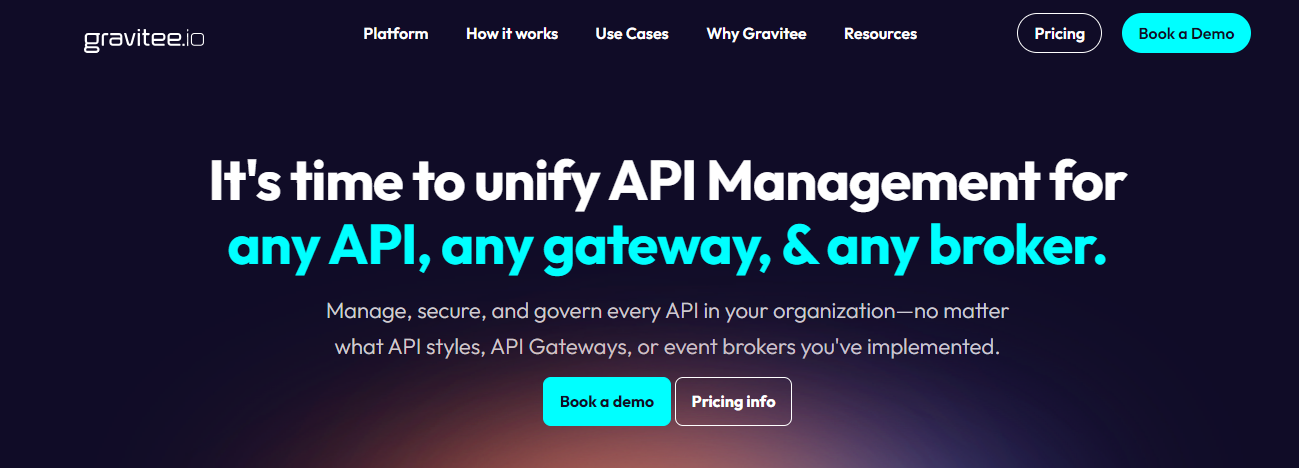
Why Gravitee Is the Best API Management Tool?
- Gravitee offers a universal developer portal to help you publish all of your APIs and event streams for self-service discovery and documentation.
- With Gravitee, you can identify and address API performance and security issues. You can do this by setting up multi-channel notifications to alert your customers about SLA breaches in real-time through email, webhooks, or messaging apps.
Standout Features
- JSON Web Token Authentication: Gravitee fully supports JWT authentication. You must validate JWTs issued by third-party applications by checking their signatures and expiration dates. Only applications with approved JWTs can access your APIs.
- Easy Debugging: Gravitee allows you to trace the entire flow of the API call so you can see and debug each step. This helps you find out exactly what went wrong and where.
- Gateway Policies: Gravitee provides dozens of policies that allow you to perform transformations, collect usage data, rate limiting, or traffic shaping. You can easily implement these policies via Policy Studio UI or the Kubernetes operator.
Pricing
Gravitee offers the following pricing plans:
- Planet: If you require an API management platform with a single production and non-production gateways, Planet Plan is a great option. It starts at $2500/month.
- Galaxy: If you are looking for two gateways each for production and non-production use with limited enterprise features, you should consider Galaxy. You can customize your plan by connecting with a Gravitee expert.
- Universe: If your organization requires enterprise features and platinum customer support, contact a Gravitee expert to utilize the Universe plan.
Ratings
According to Gartner, Gravitee has a rating of 4.6 out of 5. Users are happy with Gravitee’s modern API management platform in terms of functionality and cost.
15. SwaggerHub
SwaggerHub is an API management platform that helps you with API design and documentation. It enables you to speed up the API delivery and enhance quality through standards like OpenAPI and AsyncAPI.

Why SwaggerHub Is the Best API Management Tool?
- Using SwaggerHub, you can enhance your team’s API design workflow with features like smart error feedback and syntax auto-completion in your SwaggerHub visual editor.
- While you design, you can create API mocks automatically without coding.
- SwaggerHub also offers domains for cataloging and reusing common OAS syntax across APIs.
Standout Features
- Track Issues: You can discuss new ideas, identify issues, and address them using SwaggerHub real-time comments. These comments can function as a ticketing system, allowing you to track open issues to prioritize and resolve them effectively.
- Manage API Versions: SwaggerHub allows you to easily update and publish new API versions, ensuring that your customers always have access to the correct version when needed.
- Team Collaboration: You can centralize your API design, development, and documentation in a single, unified SwaggerHub platform. This enables team collaboration on new APIs or effortlessly discovers existing ones.
Pricing
SwaggerHub provides three pricing options:
- Free: Only one user can utilize the SwaggerHub editor for API design and documentation.
- Team: If you are looking for a plan to accommodate more users and enable team collaboration among them, Team would be a better choice.
- Enterprise: The Enterprise plan is a good option if your organization works with more than ten designers. This plan offers style guide enforcement, priority support, and advanced enterprise features.
Ratings
According to Gartner, SwaggerHub has a rating of 4.3 out of 5 for its features, such as standardization and secure collaboration throughout the API development lifecycle.
What Does an API Management Tool Do?
Let’s look at the key functionalities that an API management tool performs:
- API Design and Development: API management tools offer IDEs and developer portals to simplify the process of building an API. You can define API schemas, endpoints, and request/response formats.
- API Integration: API management tools facilitate seamless integration with other systems and applications. These tools can also help simplify the API orchestration to enhance interoperability.
- API Gateway: API gateways allow you to route incoming API requests to the appropriate backend service based on the request URL. You can handle authorization, API traffic, and access control.
- API Security: API management tools enable you to secure APIs from unauthorized access through mechanisms such as OAuth, JWT tokens, and API keys. You can also manage permissions, user roles, and access policies.
- API Testing: They offer testing frameworks for validating API functionality, security, and performance. You can create and run test cases, conduct load testing, and monitor API responses.
- API Monitoring: API tools provide monitoring services to track your API usage and performance.
- API Documentation: They can help automate the generation and maintenance of documentation.
Core Features of API Management Tools
Let’s take a look at the key features of API management tools:
API Design and Modeling
API design and modeling allow you to plan and define the structure of your APIs based on your business needs. They can also help ensure that the API is functioning correctly before implementation.
Traffic Management
Traffic management helps you control and optimize the flow of API requests to prevent overload and ensure smooth performance. It can help manage how much traffic your APIs can handle, making adjustments as needed to maintain stability.
Security and Access Control
Access controls enable you to safeguard your APIs by setting permissions and enforcing rules on who can access them. They help prevent unauthorized use and protect sensitive data from potential threats.
Monitoring and Analytics
Monitoring is essential for tracking and analyzing API performance. This provides insights into how APIs are used and identifies any issues. Analytical insights also help you understand usage patterns and make smart decisions for API efficiency.
Data Integration
An effective API management tool should enable seamless integration of diverse data sources. By connecting to various systems through pre-built connectors or APIs to database integration, you can consolidate data into a unified view. Efficient data integration platforms like Airbyte streamline this process, ensuring smooth and consistent data flow between different systems.
How to Choose the Right API Management Tool?
Here are a few best practices you can follow to select the best API management tool:
- Identify the core functionalities of an API management tool, including API design, testing, security, deployment, versioning, documentation, analytics, gateway services, and developer portals.
- Ensure the tool offers scalability to support the increasing demands of API calls.
- Beyond basic functionality, you can also look for value-added features like AI-powered analytics, machine learning, and cutting-edge security protocols.
- Check with the intuitive interface that helps simplify complex API management tasks.
- Flexible pricing models that can handle startups and large enterprises.
- Positive feedback and case studies can help you choose the best API management tool.
- Availability of training materials such as tutorials, documentation, user manuals, or videos.
- 24/7 live customer support through chat, email, or phone.
API Management Tools Use Cases
Here are use cases of API management tools:
- Business-to-Business (B2B) Integration: B2B integration through API management can help automate interactions between multiple organizations. This integration lets you work more effectively with your stakeholders and reach customers.
- GDPR Compliance: IBM states that API Gateways are essential for meeting GDPR requirements, especially when handling large volumes of data. Effective API management allows you to control access to integrations, making it easier to comply with GDPR standards.
- API Integration: API integration ensures data integrity by keeping connected applications updated with the most recent information. API management facilitates this by using APIs to connect multiple applications, allowing them to work together to complete a single task.
Summary
API management tools help your organizations by providing capabilities that range from design and development to monitoring and security. You have explored the 15 best API management tools, which offer unique features to meet your needs. The selection criteria highlighted in this article will help you choose the best tool for optimizing your business performance, improving customer experiences, and staying competitive.
FAQs
Which is the best API management tool?
The best API management tool depends on your specific needs and use cases. Popular choices include Airbyte, Apigee, SwaggerHub, and Postman. Evaluate tools based on criteria like core functionality, standout features, usability, and cost.
Are API management tools really necessary?
Yes, API management tools are essential for modern digital ecosystems. These tools help streamline API development, ensure security, manage traffic, and provide analytics.
Is Postman an API management tool?
Yes. Postman is an API management tool primarily used for API development and testing.
What should you do next?
Hope you enjoyed the reading. Here are the 3 ways we can help you in your data journey:



